The Plastic People Of The Universe – Vrátí se
from album “Midnight Mouse (Půlnoční myš)”, 1987, Freedonia 1436; also on CD “Půlnoční myš (PPU X.)”, 2001, Globus Music 210219-2
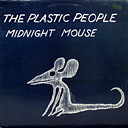
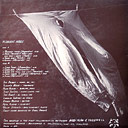
original LP sleeve (front/back), front drawing by Karel Nepraš
After re-reading Milan Hlavsa‘s straight and honest autobiography (actually an interview by Jan Pelc) Bez ohňů je underground (Without Fire That’s Underground, BFS 1992) I think it’s time to introduce you to the funkier side of the Plastic People Of The Universe. It’s not necessary to repeat the complete history of the group which has already been written elsewhere, and you will surely find even more if you use e.g. a well known search engine. Some background info is also available in my introduction to this blog. But for the lazy internet surfers here’s a couple of basic data:
The Plastic People Of The Universe (PPU) were founded in 1968 by bass player Hlavsa (1951-2001) with his school friend, guitarist Jiří “Přemek” Števich. Their concept was a psychedelic band with mystical show elements, musically inspired by Velvet Underground, The Fugs or The Mothers Of Invention. They started to perform publicly in 1969. Their freaky show made such an impact on the music scene that they almost instantly received a professional license. Since the early 70s the core of the group consisted of Hlavsa, ex-Primitives Group Josef Janíček on keyboards and guitar, Jiří Kabeš on violin and guitar and the jazzman Vratislav Brabenec on reeds. When the communist authorities systematically began to destroy the active Czechoslovak rock scene, PPU initially even tried to pass the “requalification exams”, obligatory for all musicians. Of course they failed due to their musically uncompromising attitude and from then on they were prohibited from playing in public all the way through until they officially disbanded in 1988. In 1976 Hlavsa with his band-mates, with their manager and “art director” Ivan Martin Jirous and with a couple of their friends were jailed solely for performing a private concert. That particular trial gave other Czech dissidents the impuls to form the Charta 77 organization, the first serious effort since 1968 to form an opposition against the communist regime. It needs to be stated, however, that according to Hlavsa, PPU were actually very apolitical; they simply only wanted to play their music. Some group members were forced to emigrate afterwards (e.g. Brabenec, Pavel Zajíček, but also Števich who already left PPU in the early 70s), others were systematically terrorized by the secret police over the years to come. Nevertheless, the group continued to work within their possibilities. They have managed to release a couple of albums on labels in Western Europe and in Canada, all of them clandestinely rehearsed and recorded in Czechoslovakia under conditions that certainly cannot be called ideal… (keep that in mind if you listen to any PPU recordings until 1988!)
Vrátí se (He Comes Back) comes from the PPU’s last “illegal” album Midnight Mouse (Půlnoční myš), recorded in 1985 in Prague and released two years later by Freedonia Records (although in fact the true editor was Chris Cutler of the legendary Recommended Records). Hlavsa, PPU’s exclusive composer and musical master mind, returned to writing short songs with much simpler structures than on earlier projects. The band also began to use more humorous lyrics, selected (but not written) by Václav Havel. There have used e.g. poems by German rhymer Christian Morgenstern (the title track) or, as in this song, absurd poems by Milan Nápravník: There he goes / He takes something from the corner / He puts it in a corner / He comes back / There he goes / He takes something from the corner… etc. And an interesting fact is that the first intention was to record an album with Marta Kubišová as PPU’s lead singer; Kubišová herself was completely banned by the communist authorities since 1970 until 1989. Although they even started to rehearse together, later the idea was dropped for security reasons.
In the mid 1980s, when I was already living in Switzerland, I met some people from the PPU circuit, although none of them were from their then current line-up. For example in 1983 our family was in close contact with ex-guitarist Jiří Števich, with whom we visited a very funny meeting of Czech emigrants in Alsace, France. I was even performing there on a jam session that lasted the whole night until 7 a.m. – I was sixteen and it was, aside from playing street music busking, one of my first public appearances on stage. :)
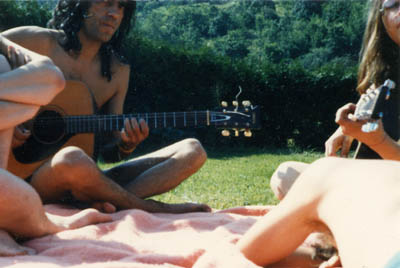
Plastic People Of The Universe reunited in almost original line-up in 1997 for the 20th anniversary of Charta 77. Sadly, Milan Hlavsa passed away in 2001 due to cancer, aged mere 50. PPU with Brabenec, Janíček and Kabeš continue to play their music until present day, most recently they performed in Prague’s National Theater (!) as a special feature in Tom Stoppard‘s play Rock’n’Roll.
Buy Plastic People CDs [2×CD / 3×LP compilation produced by yours truly].
He comes back
Posted in Funky Czech-In
1 Comment
Comments are closed.
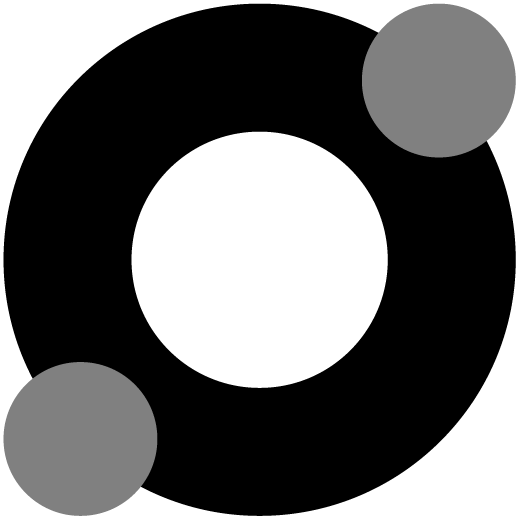
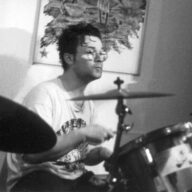
your whole blog pretty much just made my night. thank you. especially the blog on the plastics.